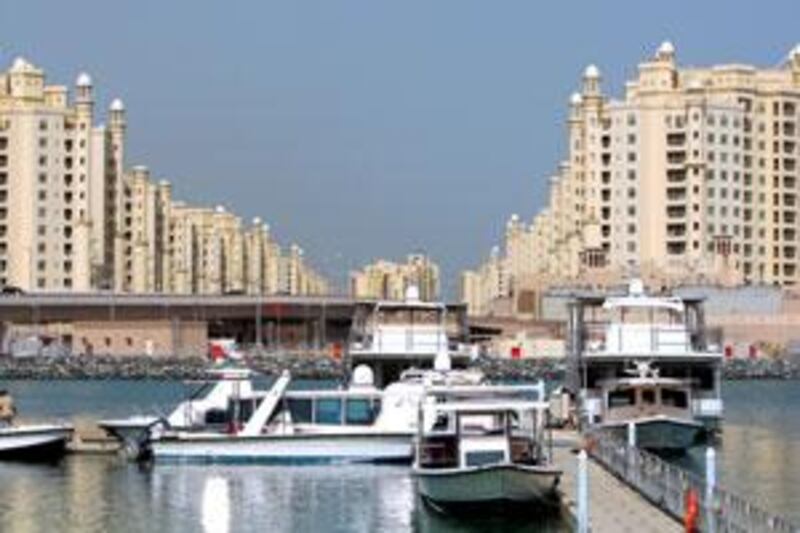Aimee Queenborough Smith always wanted to live on the Palm Jumeirah's Golden Mile but never thought she could afford it. The mother of two and her entrepreneur husband looked at the rental prices when they were in a three-bedroom apartment in Dubai's Umm Suqeim district in 2008 and decided to stay where they were. Two years later, it is a different story. The steady fall in property prices in the 18 months since the economic downturn has seen rents in some areas of Dubai decline by as much as 50 per cent.
For Mrs Queenborough Smith this has been excellent news. Late last year she and her family finally moved to a stunning three-bedroom apartment on the Palm for about the same amount of money that they had paid in Umm Suqeim. The average rent for a three-bedroom apartment on the Golden Mile is now about Dh170,000 (US$46,284) a year, which is 30 per cent down from the peak price in 2008. "It's just an exciting place to be at this time," she says. "We're near the sea, there's no traffic and it's easy to get on and off the island."
Two years ago, the picture was different. Property prices in exclusive parts of Dubai were on a par with London, while even budget homes were expensive to buy or rent. At International City, a Nakheel housing development close to Dubai International Airport, a one-bedroom flat sold for about Dh670,000 at the peak of the boom in early 2008. Now a similar property will go for as little as Dh350,000, while rents are about Dh40,000 a year.
Even playgrounds previously reserved for the rich and famous, such as Nakheel's Palm Jumeirah, are becoming attractive options. Rents for villas and apartments on the island are down by about half since the fourth quarter of 2008, prompting tenants to upgrade their homes. "There has been a big increase of people moving on to the Palm; they are able to afford the things they couldn't afford before," says Clare Reymond, a consultant at Edwards and Towers, a property agency.
But while activity in the rental market is brisk, estate agents say sales are still sluggish. When the palm-shaped man-made island was launched in 2002, the price of a "signature villa" with its own beach was Dh4.1 million. By the time the development was completed six years later, that price jumped to Dh16m. But when the economic downturn hit the Dubai property market the asking price almost halved to Dh8.5m.
"January was miserable, February didn't start much better, but now we're getting busy again; I've got five clients wanting to buy. Prices are stable," says Richard Pemberton, a consultant at Edwards and Towers. Even so, declining prices have still not attracted buyers such as Clive Frost, who has been looking at villas on the Palm for a while. Mr Frost, a businessman, moved to Dubai from the UK in the late 1980s and is waiting for prices to fall further before taking the plunge.
"I do still want to buy, but prices would have to be at least another 25 per cent less. In fact, in this market, they should actually be down to the price the property was originally sold for," he says. Further inland, homes are selling close to original prices. Villas in the older areas of Dubai such as Emirates Hills, The Springs, The Lakes and Jumeirah Islands are becoming increasingly popular.
"It's as if we're going back to the old days," says Greg Antioch, a sales negotiator at Cluttons, a property consultant. "It's really the established, family communities that are doing well. Owners are relatively realistic about the prices, so they're taking the chance." Mr Antioch sold four villas last month at The Lakes, where a four-bedroom home is Dh4m compared with as much as Dh8m in late 2007. Inquiries are picking up.
"It's right next to Emirates Hills, but smaller than the Meadows. The customer profile varies; one is a company looking to buy for its director, the other is a British family and an Indian investor looking to buy to rent," Mr Antioch adds. But with bank lending still tight, today's buyers need to be cash-rich. Dilip Daswani is the director of Capitol Real Estate, a Dubai brokerage that deals mainly with rental property, and a seasoned investor. He owns a villa in Arabian Ranches and two apartments in Downtown Burj Khalifa, which he rents out. He also has an apartment in Burj Khalifa, the tallest tower in the world, which he plans to sell when properties in the building are handed over to owners.
Right now, he is waiting before he buys more property. "At the moment, things are very cheap, but the money is still a bit of a problem and banks are still not lending properly. But by the end of this year, I see things changing," he says. "But if I was to buy now, I would buy a villa in either Jumeirah Islands or Emirates Hills, or a flat in Old Town [Downtown Burj Khalifa]." On the positive side, it has never been a better time to rent. "The people aren't new, they are just moving back to Dubai from other areas in the emirates because prices are much cheaper," Mr Daswani.
Among those people is Mrs Queenborough Smith, who has always dreamed of living by the sea. "We live somewhere that the whole world knows," she says. "It's iconic." @Email:agiuffrida@thenational.ae






